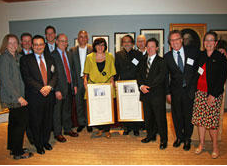Greenpeace: corporations 'govern' our desires, so let's get greenwashing
BLOG POST posted on May 25, 2011 by dawn
Earlier this month in a blog post, Amy Larkin, the Solutions Director of Greenpeace USA asked a question of her organziation that many of us have been wondering about.
"Why are we working so closely with these corporations?" wrote Larkin. "Because corporations now govern how we live, where we live, what we eat, wear, and desire... and also whether or not our natural world retains its bounty, its beauty and its beneficence," she wrote.
Even though I've been critical of Greenpeace for some time now, it still irked me when I read the statement above. Basically, I take it to mean the following: corporations rule the world, and so we're going to "fight" so that they will become greener, friendlier firms with better ads and even smilier faces. Greenpeace might as well be greening jails at this point. Absolute bollocks.
"Business as usual is no longer possible; for corporations, the greenest possible practices ensure a safer and more secure business environment as well," wrote Larkin.
Interesting choice of words, no? Can we take that to mean that Greenpeace is now in the business of making business environments more secure for the very entities that are logging, paving, drilling, and strip mining the earth?
My feeling is that creating a secure business environment is exactly what the Canadian Boreal Forest Agreement was about. Greenpeace was the lead environmental non-governmental organization (ENGO) on that deal, which was between nine ENGOs and 21 forestry firms. The notion fits within a strategy of staging campaign actions against a given company while higher ups in Greenpeace negotiate deals with the same company. Or, as Newsweek dubbed it: Good cop/bad cop goes green.
Larkin's blog goes on, and I'll quote from it again. "Greenpeace believes that economies must thrive – which means that business must thrive," she writes. Then comes the clincher: "Our basic stipulation is that the return on investment of business must be connected to the survival of the natural world. The inverse is equally true -- clean air, water, land and ecosystems are as essential to business as they are to living things."
I'm not even going to start deconstructing that one, it is just too ridiculous. Now I know there's nothing new here. But I think it is useful to hear it straight from the horse's mouth, if only to register the information and continue to put our energy into grassroots struggles -- ones that aren't being fought on a terrain where capitalism and corporate control are taken as a given.
The site for the Vancouver local of The Media Co-op has been archived and will no longer be updated. Please visit the main Media Co-op website to learn more about the organization.


Comments
the business of survival
"...creating a secure business environment is exactly what the Canadian Boreal Forest Agreement was about."
Right on, Dawn. Thanks for posting this. As you say, it's so much better to hear it from the horse's mouth. "...the return on investment of business must be connected to the survival of the natural world." Gah. Talk about putting the peg in the wrong hole.
Greenpeace has evolved into
Greenpeace has evolved into something not unlike the things it fought against in the beginning. Soliciting donations is priority number one. Capitalism and corporate control are taken as a given? Well, unless you believe the Exxons and Nissans of the world will cease operations with the right amount of coaxing.... of COURSE they are a given.
Think what she meant was ...
Grassroots struggles don't try to fight/resist the corporations on their (the corporations) own terms, which is of course a pointless exercise doomed to failure.
Greenpeace has become a business, which means they're only interested in perpetuating themselves like a damn virus. They play apologist for business as usual and fool many folks in to thinking that the likes of logging companies have grown a conscience.
Even if you take the cynical view, hoping that "green capitalism" is just a sense of self preservation kicking in, that industry is starting to realize they can't make money on a dead planet ...you'd be wrong!
Time and again, everywhere you look, you see the all mighty profit motive taken to suicidally self destructive extremes. It's completely pathological and built in to the system.
Only effective means of resistance is massive disruption orchestrated by regular folks like us.
yes
well said thank you J. i suppose my word choice could have been clearer. but you've captured the spirit of what i aimed to get across.
The problem is
The problem is that enviro and political activist orgs like greenpeace are too easily infiltrated by people wishing to subvert them or use them for their own gain. We have many documented cases of our government infiltration, and it would be ridiculous to assume that corporations don't do the same.
So how does a group prevent this type of corruption and maintain the purity of its original aim, how to vet those who would volunteer or go to work as paid employees?
Try some democracy?
Part of the problem with Greenpeace is that there is no means for grassroots members to control the organization. It is messy, but even imperfect membership based stuctures like the Sierra Club(s) have is better than having a completely unaccountable group make all the decisions.
The challenge is to create grassroots democracy that works a lot better than the weak Sierra Club model.
Three words: know thy enemy
Infiltrators are proof that you're doing something right. It's a kind of backhanded compliment from the powers that be. Your organization is worth them spending money to hire conniving little scum-sucking douchebags to try and disrupt your efforts.
So keep your eyes peeled and take the compliments when they come. Simple.
If you really know what your strategy and goals are, it should be clear when people are subverting them. Just don't immediately call all the militants agent provocateurs or I'll cry.
You don't want to see me cry. It's awkward.